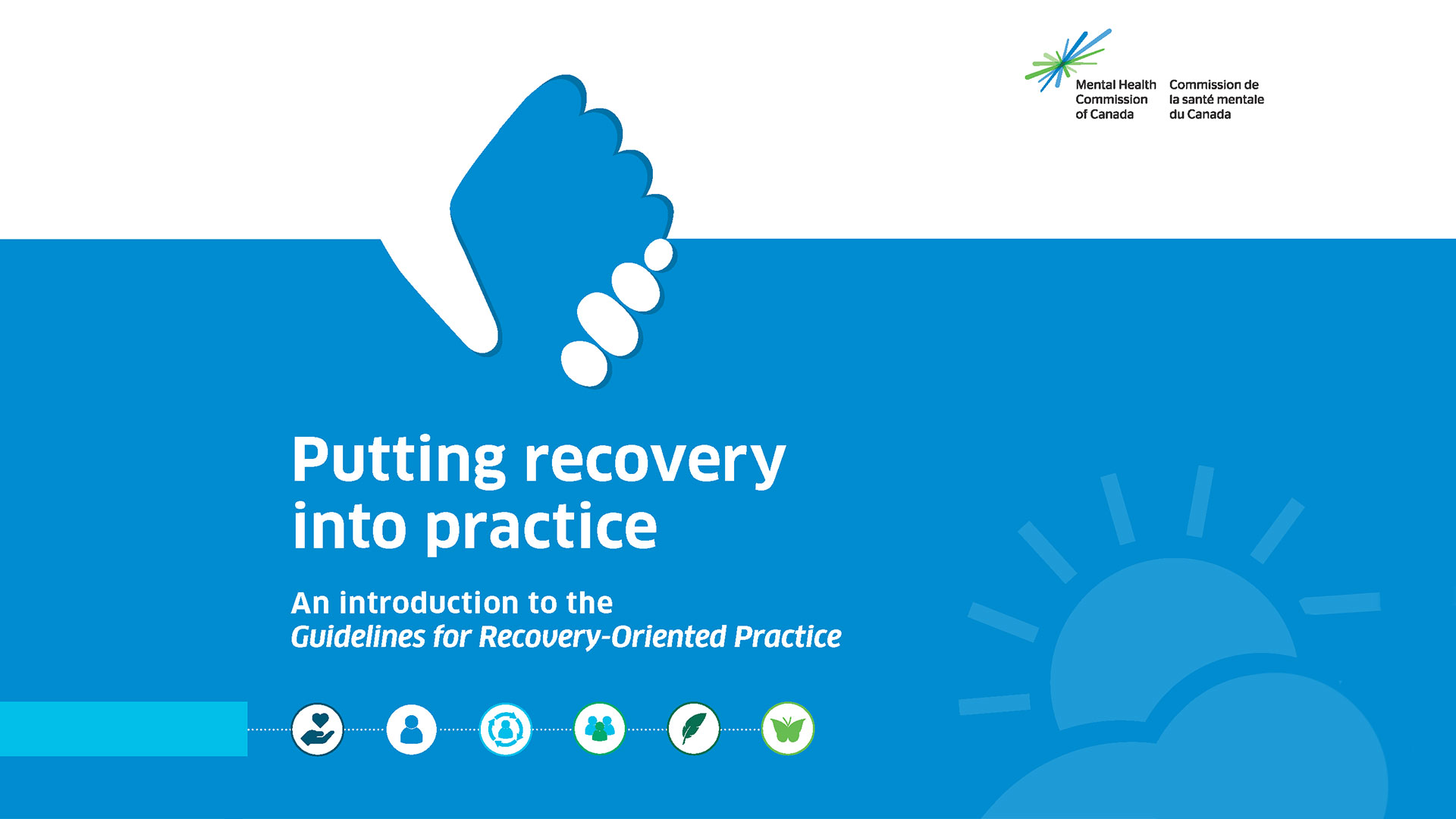If you are in distress, you can call or text 988 at any time. If it is an emergency, call 9-1-1 or go to your local emergency department.
- Guidelines, Professional Resources
Putting recovery into practice: An introduction to the Guidelines for Recovery-Oriented Practice
About this document: Recovery is built on partnership Why recovery-oriented practice matters What health-care workers do and how they do it matters greatly to their clients and how they experience care. This experience can support or inhibit recovery. When a person is not included in their own treatment decisions, the experience can feel uncaring, paternalistic, and stigmatizing. Recovery-oriented practice instils hope and empowers and sustains the recovery journey. The Guidelines for Recovery-Oriented Practice (Guidelines) help health-care workers understand what is important to clients, encourage workers to reflect upon their practice and approaches with others, and describe how workers can best support someone’s recovery journey. All workers in the mental health service system, regardless of their role, profession, discipline, seniority, or degree of contact with the people who access services, are encouraged to implement recovery-oriented practice. Everyone can help embed the philosophy and principles of recovery throughout an entire organization — from leadership and policy development to the individual processes of care delivery, the physical environment for care, and the outreach and activities that interface with the community. The Guidelines provide a comprehensive description of the values, attitudes, knowledge, and skills that workers need to put recovery principles into practice. Who the Guidelines document is for
This introduction summarizes the Guidelines and gives an overview of recovery-oriented principles and what they look like in practice. It is meant for all organizations, whether they are just starting to think about adopting a recovery-oriented approach or have already done significant work in this area.
Recovery recognizes that each person is unique and has the right to determine their own path toward mental health and well-being. It also recognizes that we live in a complex society with many intersecting factors that affect mental health and well-being. As a practice, recovery requires an active, dynamic partnership between a person and their support team, which may include health-care providers, family members, friends, and others. Decisions about goals, treatments, and care are made jointly, not imposed, and can evolve over time as a person’s needs and circumstances change.
Everyone deserves respect, dignity, and the opportunity to live a life consistent with their hopes, goals, and aspirations. These are our collective human rights. In recovery-oriented practice, all people are recognized to have strengths, passions, and purposes to celebrate and build upon. When people accessing services experience this respect and recognition, it builds hope and optimism for recovery. Health-care workers help create hope by how they interact with others and how they engage with clients, caregivers, and community partners. Health-care providers who work in partnership with people experiencing mental health problems and illnesses can support them in achieving the outcomes they are looking for, even as those aims evolve over time.
The Guidelines document is meant for anyone with a stake in mental health care, including mental health professionals, staff, and volunteers; policy and decision makers; professionals in other service systems or sectors that contribute to mental health and well-being; and anyone accessing mental health services and their supporters. Different persons and populations have different needs and every organization has to tailor its recovery approach to suit the people it serves. The Guidelines document is designed with this flexibility in mind — across the spectrum of mental health conditions and life stages.
- Guidelines, Professional Resources
Putting recovery into practice: An introduction to the Guidelines for Recovery-Oriented Practice
Putting recovery into practice: An introduction to the Guidelines for Recovery-Oriented Practice
- Health-care Providers
About this document: Recovery is built on partnership Why recovery-oriented practice matters What health-care workers do and how they do it matters greatly to their clients and how they experience care. This experience can support or inhibit recovery. When a person is not included in their own treatment decisions, the experience can feel uncaring, paternalistic, and stigmatizing. Recovery-oriented practice instils hope and empowers and sustains the recovery journey. The Guidelines for Recovery-Oriented Practice (Guidelines) help health-care workers understand what is important to clients, encourage workers to reflect upon their practice and approaches with others, and describe how workers can best support someone’s recovery journey. All workers in the mental health service system, regardless of their role, profession, discipline, seniority, or degree of contact with the people who access services, are encouraged to implement recovery-oriented practice. Everyone can help embed the philosophy and principles of recovery throughout an entire organization — from leadership and policy development to the individual processes of care delivery, the physical environment for care, and the outreach and activities that interface with the community. The Guidelines provide a comprehensive description of the values, attitudes, knowledge, and skills that workers need to put recovery principles into practice. Who the Guidelines document is for
This introduction summarizes the Guidelines and gives an overview of recovery-oriented principles and what they look like in practice. It is meant for all organizations, whether they are just starting to think about adopting a recovery-oriented approach or have already done significant work in this area.
Recovery recognizes that each person is unique and has the right to determine their own path toward mental health and well-being. It also recognizes that we live in a complex society with many intersecting factors that affect mental health and well-being. As a practice, recovery requires an active, dynamic partnership between a person and their support team, which may include health-care providers, family members, friends, and others. Decisions about goals, treatments, and care are made jointly, not imposed, and can evolve over time as a person’s needs and circumstances change.
Everyone deserves respect, dignity, and the opportunity to live a life consistent with their hopes, goals, and aspirations. These are our collective human rights. In recovery-oriented practice, all people are recognized to have strengths, passions, and purposes to celebrate and build upon. When people accessing services experience this respect and recognition, it builds hope and optimism for recovery. Health-care workers help create hope by how they interact with others and how they engage with clients, caregivers, and community partners. Health-care providers who work in partnership with people experiencing mental health problems and illnesses can support them in achieving the outcomes they are looking for, even as those aims evolve over time.
The Guidelines document is meant for anyone with a stake in mental health care, including mental health professionals, staff, and volunteers; policy and decision makers; professionals in other service systems or sectors that contribute to mental health and well-being; and anyone accessing mental health services and their supporters. Different persons and populations have different needs and every organization has to tailor its recovery approach to suit the people it serves. The Guidelines document is designed with this flexibility in mind — across the spectrum of mental health conditions and life stages.
SHARE THIS PAGE
RELATED

Review our Assessment Framework for Mental Health Apps — a national framework containing key standards for safe, quality, and effective mental health apps in Canada.

To help expand the use of e-mental health services, we developed four online learning modules based on our Toolkit for E-Mental Health Implementation, in collaboration with the Centre for Addiction and Mental Health (CAMH).

Stepped Care 2.0© (SC2.0) is a transformative model for organizing and delivering evidence-informed mental health and substance use services.
